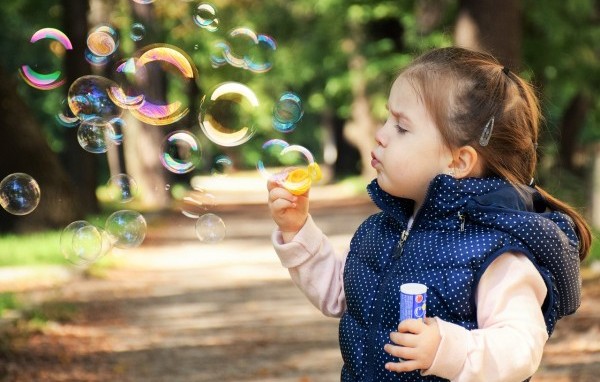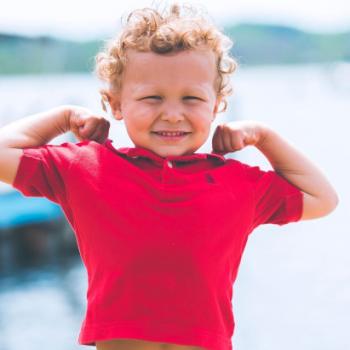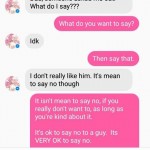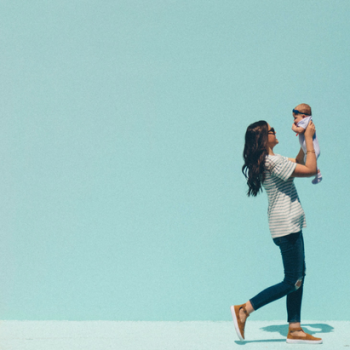“Ayuda!” My feisty seventeen-month-old daughter has mastered the art of asking for help, in Spanish no less. When Sam turned one my husband and I enrolled her at Spanish immersion childcare center not far from our house. During the week her sponge-like brain is absorbing a language different from the one she hears at home. Effortless bilingualism, the school calls it.
Language helps us make sense of ourselves and our world, and as a parent I take the responsibility of setting a strong communication foundation seriously. In her infancy I learned to narrate even the most mundane tasks like making toast and folding laundry. I sang her to sleep with made-up verses to the tune of “The Itsy Bitsy Spider.”
Now that she’s a toddler, words are easy and important to share with her at this stage of mimicry and exploration (though we are realizing the impending need to filter what we say more often!) At her upcoming check-up her pediatrician undoubtedly will ask us, “How many new words does Sam have?”
Even for the youngest among us, naming is powerful. Sam delights whenever she sees a dog (or any animal for that matter) and can shout her favorite word: “Puppy!” Each time she does so we feel a surge of pride that she is learning to communicate with and about the world around her.
As with any aspects of parenting, this stage is temporary and fleeting. In another year or two she will be speaking to us in full sentences and no doubt asking us countless questions. On a walk the other day my husband said, “Won’t it be strange when Sam talks all of the time?” He and I are both the youngest in our families and often felt “shushed” by our older siblings and parents. Speaking to Sam in a way that respects her as a person is one of our highest and shared values.

Image: Pixabay
A few weeks ago I had quite a jolt when I listened to Peggy Orenstein’s interview on NPR about her latest book Girls & Sex: Navigating the Complicated New Landscape. Although she was speaking primarily about girls in their teens, one thing she said has been nagging me about my own parenting.
Parents don’t tend to name their infant baby’s genitals if they’re girls. For boys, they’ll say, “Here’s your nose, here’s your shoulders, here’s your waist, here’s your pee pee,” whatever. But with girls, there’s this sort of blank space — it’s right from navel to knees, and not naming something makes it quite literally unspeakable.
During college and divinity school I participated in productions of The Vagina Monologues and found power in reclaiming the word “vagina”as something to be said without pause and with great pride. I got used to saying it. But then of course, “vagina” is not often what we mean when we say it. What we usually mean is the “vulva,” a word I have rarely heard or used. Even with my daughter.
I want my daughter to grow up knowing her body is beautiful, powerful, sacred. That isn’t something she’s naturally going to gain from living in our world. In fact it will tell her at a scarily young age that her body is imperfect and its worth lies solely in the pleasure of the male gaze. And I’m concerned she will learn this not only from the culture, but also from the church. Like I did.
I was a youth group kid when the True Love Waits movement was gaining popularity. From this curriculum I learned to see my sexuality as a liability and my female body as a source of temptation. At age 13 I took a purity pledge to remain abstinent until marriage. There are plenty of good reasons for young people to delay sexual experiences with a partner, but my motivation for taking this pledge were based in pure fear: If I didn’t take the pledge, I might not be accepted fully by my faith community. If I had sex before marriage, it would diminish my worth as a human being.
As a Christian I believe that each of us is created in the image of God with innate sacred worth. That worthiness does not stop just below our navels. I want to teach my daughter that nothing about her body is unspeakable–that each part deserves love and respect–and that begins with naming them. I’ll confess that saying “vulva” to my toddler feels a little bit strange and uncomfortable. But each time I do, I am breaking the silence of my own pain and hoping new life springs from it.
For Sam and for me.
Katey Zeh, M.Div is a strategist, writer, and educator who inspires intentional communities to create a more just, compassionate world through building connection, sacred truth telling, and striving for the common good. She has written for outlets including Huffington Post, Sojourners, Religion Dispatches, Response magazine, the Good Mother Project, the Journal for Feminist Studies in Religion, and the United Methodist News Service. Find her on Twitter at @ktzeh or on her website www.kateyzeh.com.












